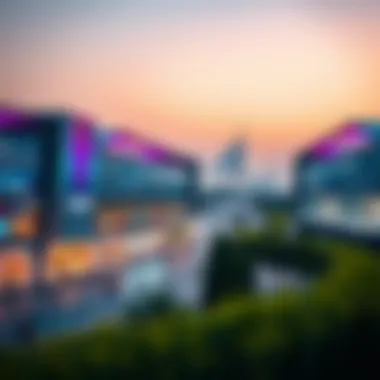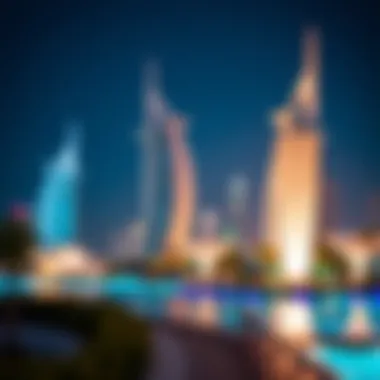Understanding the Dates and Impact of Dubai Expo 2020


Intro
Dubai Expo 2020 was not just another exhibition; it was a defining moment for the city’s aspirations and identity on the global map. Originally slated for 2020, the Expo was postponed due to the pandemic, and it eventually took place from October 1, 2021, to March 31, 2022. This event brought together countries, cultures, and ideas under one umbrella. With all the hustle and bustle, there were significant implications not only for Dubai’s skyline but also for its economic landscape, particularly in real estate.
From the initial planning stages in 2013 to the subsequent reveal of the Expo’s pavilions, the timeline of the event carried immense weight. Each date and milestone had a ripple effect, influencing local businesses, international relations, and investment trajectories. This article endeavors to untangle the specifics surrounding these key dates and the broader implications they bear on various sectors, especially real estate, which remains a hotbed of activity post-Expo.
As we navigate through the nuances of the Expo, we will unpack how the event fostered interest from expatriates, investors, and real estate agents alike, transforming Dubai into a vibrant hub for commerce and culture.
Market Trends
Current Market Overview
With Dubai emerging from the shadow of the pandemic and entering a new chapter, the real estate market is witnessing a significant revival. As of late 2021, property transactions surged, fueled in part by the anticipation surrounding the Expo. According to various reports, the demand for residential and commercial properties spiked as businesses and individuals sought to capitalize on the Expo’s global stage.
The eco-system of the market is dynamic. The residential sector is seeing a rise in demand for luxury properties, especially in developments around Dubai Marina and Downtown. The pandemic has shifted the focus slightly; buyers and renters are now looking for more spacious environments that accommodate the work-from-home culture. Familial settings and community-oriented developments are gaining traction, aligning well with the broader trends we view today.
Predictions for Future Developments
Looking ahead, as the dust settles from the Expo, several predictions stand out:
- Increased Operational Activity: The Expo has set the groundwork for future innovation districts that will likely draw in further investments.
- Sustainability as a Key Driver: We expect the trend towards sustainable living to grow, with eco-friendly developments receiving more attention.
- Infrastructure Development: Continuing upgrades in infrastructure like transportation systems will further enhance the desirability of outlying areas.
Investors are advised to keep tabs on these trends, as they may shape investment opportunities in coming years, influencing where they want to channel their resources.
Investment Opportunities
High-Growth Areas
Some neighborhoods stand out as burgeoning investment hot spots. Areas like Dubai Creek Harbour and Dubai Hills Estate showcase promising growth prospects, owing largely to their strategic locations and modern amenities.
- Dubai Creek Harbour: Positioned to be a centerpiece of the city with its stunning waterfront and sustainable living spaces.
- Dubai Hills Estate: Offering a balanced lifestyle with proximity to work, play, and greenery, it’s particularly appealing to families and expatriates.


Types of Properties to Consider
Given the shifts in rental preferences and a booming market, various property types present excellent opportunities:
- Luxury Apartments: Always in demand, especially within high-end areas.
- Villas: Families often search for more space, making villas a popular option.
- Commercial Spaces: With more businesses setting up shop post-Expo, commercial real estate is ripe for growth.
In summary, the implications of Dubai Expo 2020 extend beyond a mere showcase of culture and innovation. Investors and homebuyers alike should carefully consider the evolving landscape, as the Expo has likely laid the foundation for enduring growth and transformation in Dubai's real estate sector.
"The timing and planning of major events like the Expo can significantly alter a city’s real estate trajectory, as evidenced in Dubai."
For further insights, resources like Wikipedia, Britannica, and relevant discussions on Reddit can be explored.
Historical Context of Expo Events
Understanding the historical context of World Expos provides a valuable lens through which to view the significance of events like the Dubai Expo 2020. Expos, also known as World's Fairs, have been platforms for showcasing progress and innovation across a multitude of fields, ranging from architecture to technology to art. They are monumental gatherings that not only attract visitors from around the globe but also aim to foster a spirit of collaboration and cultural exchange.
Global Significance of World Expos
World Expos are more than mere exhibitions; they are stage where countries strut their stuff. Historically, they help nations promote their cultures and advancements. They serve as a launchpad for new technologies, such as the telephone introduced at the 1876 Philadelphia Expo or the Eiffel Tower, which was built for the 1889 Paris World's Fair. These events set the stakes for international dialogue and often lay down the groundwork for future achievements.
They hold a mirror to societal values and technological shifts, often reflecting the zeitgeist of the time. For instance, the theme of Expo 67 in Montreal was "Man and His World,” revolving around human development and environmental awareness. This theme resonates even more today as we grapple with global issues such as climate change. In this sense, the Dubai Expo 2020, which aimed to be a place of dialogue and innovation, was especially relevant in a world increasingly focused on sustainability and collaboration.
Previous Expos and Their Impact
Delving into the evolution of past expos reveals their far-reaching effects on cities and nations. One prime example is the 1967 Expo in Montreal, which saw significant urban development spurred by the international event. Infrastructure improvements and urban renewal in Montreal boosted its global profile, turning it into a hub for commerce and culture. Cities often leverage expos to enhance their urban landscapes and, by extension, their economies.
Another noteworthy instance is the Shanghai Expo in 2010, where over 70 million visitors arrived, showcasing not only China’s rapid growth but also its cultural heritage. The connections fostered during this expo translated into increased trade relationships and investments, prompting a continuing influence on global economics long after its conclusion.
Different expos have their unique storylines and outcomes, but the common thread remains: a profound impact on host cities and countries through tourism, commerce, and international relations. For Dubai, hosting the Expo 2020 gave it a chance to solidify its status as a leading global city while advancing its economic diversification goals.
"World Expos are not just exhibitions; they are milestones that define a nation’s progress and aspirations."


As we explore the specifics of Dubai Expo 2020, it becomes essential to consider this historical context. It helps frame the ambitions Dubai set for itself during the expo and sheds light on the expectations and aspirations that attended this grand event.
Key Dates of Dubai Expo
The key dates surrounding Dubai Expo 2020 are not just simple calendar entries; they represent moments that shaped the city's vision and aspirations. Each date in the timeline carries significance that impacts not only the event itself but also resonates across different sectors, especially within real estate and investment. Understanding these dates is crucial for stakeholders—whether they are investors watching for opportunities, expatriates navigating new environments, or businesses wanting to engage with a massive influx of international visitors.
Initial Announcement and Preparations
The groundwork for this global expo began well before the first visitors set foot on the site. The initial announcement came in 2013, when the UAE won the bid to host the Expo, marking a pivotal milestone. This victory was celebrated as a recognition of the UAE's evolving role on the world stage. Immediately after, preparations kicked into high gear; there was a hive of activity as planners and stakeholders brainstormed themes, designs, and logistics.
This phase wasn’t merely about construction; it involved extensive consultation with private and public sectors alike, ensuring that every aspect was considered. The decisions made during this time would lay the patterns for participation, architectural concepts, and the overarching narrative of the event. Businesses began looking ahead, and real estate developers started planning for the expected boom in visitors and investments connected to the Expo. For instance, properties in areas surrounding the expo site saw early interest from potential buyers and renters, who recognized the long-term value of being close to this major attraction.
Official Opening Date
The official opening date—October 1, 2021—was marked by much anticipation. This opening was significant not just as a ceremonial event but as a launching point for a host of activities and interactions that would unfold over the following months. The grand inauguration showcased the UAE's cultural richness, technological prowess, and commitment to sustainability, embodying the themes of the expo.
The impact of this date extended beyond the event gates. It signaled to investors that Dubai was ready to bolster its standing in the global economy. With thousands of visitors expected, businesses quickly adapted and showcased their products on a global scale. Consequently, many real estate investors were keen to capitalize on the influx of attendees, aiming to convert interest into lucrative opportunities—all riding on the momentum of the expo's opening.
Duration and Closing Events
Stretched over six months, the duration of the Expo—running from October 1, 2021, to March 31, 2022—provided ample time for diverse audiences to engage in dialogues around the core themes of sustainability, mobility, and opportunity. Each month brought unique opportunities and events, reflecting a well-structured program designed to keep visitors returning. Such a long duration allowed for a deeper cultural exchange, giving nations a platform to present their innovations and ideas effective.
As the closing events approached, anticipation built for the grand finale. This culminated in a spectacular closing ceremony, encapsulating not only the success of the Expo but also the prospects for the future. This event formally signaled the end of an era but marked the beginning of new opportunities for the emirate's economy. The frenzy surrounding the closing acts spurred localized investment once more, as insights gleaned from participants directed the future policies of urban developments in the region.
In summary, the key dates of Dubai Expo 2020 structured an intricate lattice of planning, execution, and closure, contributing vital to the UAE's vision for a diversified economy and a leading global identity. The implications for those in the real estate market and investment businesses are profound, emphasizing the need for constant awareness of such pivotal moments in time.
Thematic Focus of Dubai Expo
The thematic focus of Dubai Expo 2020 is paramount, serving as a lens through which attendees, participants, and investors can explore the most pressing global issues of today. The expo brought together nations, companies, and individuals under three key umbrellas: Sustainability, Mobility, and Opportunity. Each theme is intricately woven into the fabric of the event, reflecting advanced thinking and innovation. Focusing on these themes not only highlights global challenges but also encourages collaborative solutions, reinforcing Dubai’s position as a progressive city on the world stage.
Sustainability


The concept of sustainability has become more than just a buzzword; it is integral to the very survival of our planet. At Expo 2020, this theme dominated conversations and exhibits alike. Sustainability wasn’t merely showcased; it was enshrined in practical applications.
Visitors experienced cutting-edge technologies aimed at reducing waste and promoting renewable energy. For instance, a notable feature was the Sustainability Pavilion, designed to inspire innovations that tackle climate change. There, concepts such as creating sustainable cities, food security, and water conservation were on display.
The expo also reflected sustainable practices in its infrastructure, including energy-efficient designs and solutions that exemplify green architecture. This direction not only serves the environment but also resonates with businesses and individuals looking to invest in eco-friendly initiatives. It showcases the opportunity for investors to tap into the growing demand for sustainability in urban development.
Mobility
Mobility is the backbone of any thriving city and in context of Dubai Expo 2020, it surpassed mere transport; it signified progress, inclusivity, and the interconnectivity of societies. One could witness this theme embodied in exhibits showcasing autonomous vehicles, smart mobility solutions, and state-of-the-art transportation systems.
An example was the Mobility Pavilion, where innovations such as Hyperloop systems and aerial taxis sparked intrigue. Beyond glitzy tech, understanding mobility also meant addressing social issues like accessibility; thus, a focus on making transportation available and efficient for all was central.
The ripple effects of a strong mobility strategy have vast implications for real estate, as areas adjacent to these future mobility corridors gain desirability. Developers can consider strategic planning to integrate these transport hubs in urban designs, thus ensuring lasting value.
Opportunity
Finally, the theme of opportunity encapsulates the essence of what the expo aimed to achieve: fostering potential, enhancing collaboration, and inspiring future generations. This section sought to present initiatives aimed at enabling entrepreneurship and economic diversification:
- The Opportunity Pavilion served as a melting pot of ideas and innovations, where startups and emerging technologies took center stage.
- Programs encouraging young talent to engage in dialogue with global leaders were crucial for fostering a new wave of innovation.
- Various workshops and seminars highlighted the importance of bridging gaps in education and skill development necessary for tomorrow's workforce.
Opportunities presented at the expo looked beyond just immediate gains; they fostered a long-lasting impact, inviting global talents to consider Dubai as a viable option for growth and innovation. This theme, in particular, can lead to new investment opportunities, inviting real estate developers to create spaces that are conducive to these entrepreneurial spirits.
Expected Visitors and Participation
The presence of global visitors and countries is bedrock to the success of any expo. For Dubai Expo 2020, the anticipations around visitor demographics and nation participation were not merely numbers on a page; they were pivotal to shaping how Dubai would be showcased to the world. Understanding the expected visitor capacity sheds light on economic opportunities, cultural exchanges, and networking possibilities that impact not just the event, but also the wider metropolitan landscape.
Global Attendance Projections
Dubai Expo 2020 set its sights on attracting around 25 million visitors over its six-month duration. This figure reflects a broader ambition for bringing together not just tourists, but professionals, investors, and decision-makers from diverse sectors. The expected influx translates to significant economic activity, further enhancing the real estate market and hospitality sector.
plaintext
- Anticipated figures:
- 70% from out of Dubai
- 30% local visitors



